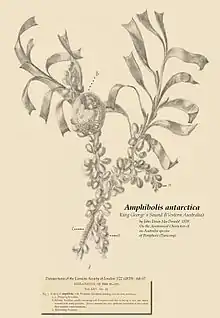Amphibolis
Amphibolis is a genus in the family Cymodoceaceae. It includes two species of sea grass endemic to the western and southern coast of Australia, Amphibolis antarctica and Amphibolis griffithii, commonly known as sea nymph or wire weed.
| Sea nymph or wire weed | |
|---|---|
 | |
| Amphibolis antarctica[1] | |
| Scientific classification | |
| Kingdom: | Plantae |
| Clade: | Tracheophytes |
| Clade: | Angiosperms |
| Clade: | Monocots |
| Order: | Alismatales |
| Family: | Cymodoceaceae |
| Genus: | Amphibolis (Labillardière) Sonder & Ascherson ex Ascherson |
| Synonyms[2] | |
| |
The seeds produce an anchoring comb of bristles while they mature on the female plant, giving the seedling a purchase when it arrives at a new site.
A type of seagrass, the plants of this genus forms meadows on calcareous sands. These meadows, and their consequent detritus, become an important source of food and shelter for a number of marine species. The interweaving roots and leaves consolidate the substrate of the ocean floor, protecting it from erosion by currents and wave action.
Species
There are two species:[2]
- Amphibolis antarctica (Labill.) Asch. - SA Tas Vic WA
- Amphibolis griffithii (J.M.Black) Hartog - SA WA
References
- 1859 illustration from Linnean Society of London - Transactions of the Linnean Society of London v22
- Kew World Checklist of Selected Plant Families
- Mike van Keulen (25 October 2005). "Amphibolis". Western Australian Seagrass. Murdoch University. Archived from the original on 1 September 2007. Retrieved 16 December 2007.
- "Amphibolis". FloraBase. Western Australian Government Department of Biodiversity, Conservation and Attractions.
- Guiry, M.D.; Guiry, G.M. (2008). "Amphibolis". AlgaeBase. World-wide electronic publication, National University of Ireland, Galway. Retrieved 21 February 2009.